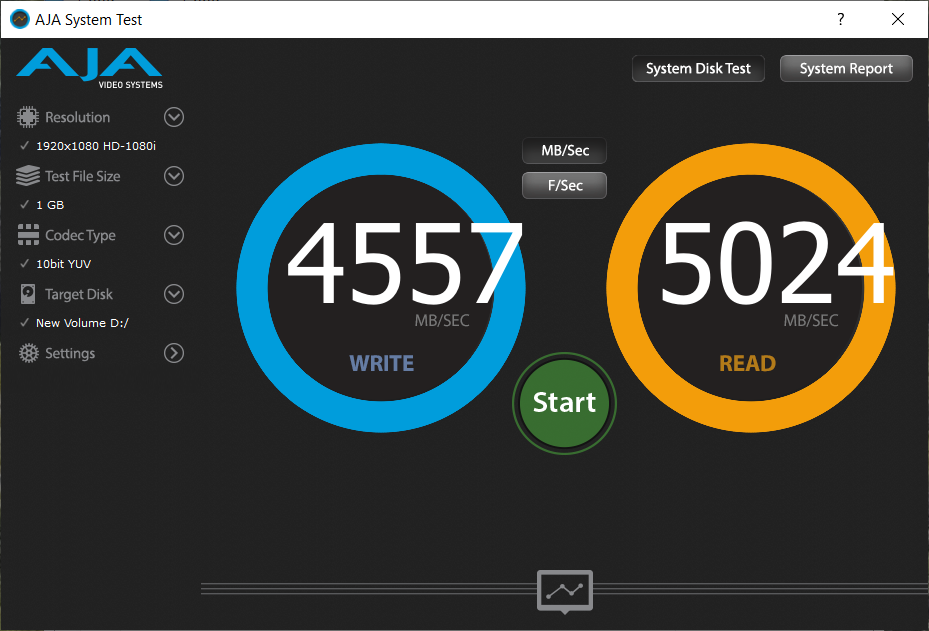The AJA Video Systems Disk Test is relatively new to our testing and tests the transfer speed of video files with different resolutions and Codec.
TxBench is one of our newly discovered benchmarks that we works much the same as Crystal Diskmark, but with several other features. Advanced load bench-marking can be configured, as well as full drive information and data erasing via secure erase, enhanced secure erase, TRIM and overwriting. Simply click on the title for a free copy.
PCMARK 10 FULL SYSTEM STORAGE BENCHMARK
PCMark 10 Storage Benchmarks produce an overall score as a measure of drive performance. Comparing devices is as simple as comparing scores. The tests also measure and report the bandwidth and average access time performance for the drive. Each test uses traces recorded while performing real-world tasks such as booting Windows 10, starting applications such as Adobe Photoshop and Illustrator, working with applications such as Microsoft Excel and PowerPoint, and copying several large files and many small files.
PCMARK 10 QUICK SYSTEM STORAGE BENCHMARK
The Quick System Drive Benchmark is a subset of the Full test and is more representative of typical daily usage to show what would be expected regarding hybrid SSD performance on a day-to-day basis.
We hesitate to run any comparisons as we hadn’t been using PCMark 10 just yet last we tested with the AMD Bench and there may be differences simply given the difference between Intel and AMD.
REAL WORLD FILE TRANSFER COMPARISON
For our True Data Testing, we simply loaded 15GB video, music, photo and OS files onto the Crucial P5 Plus Gen 4 NVMe SSD and copied the data to a new folder on that same disk.
This result really confused us and each of these tests were conducted with our AMD Test Bench. We couldn’t believe there would be any way possible for Crucial’s best 176-layer TLC NAND flash memory to sit behind…QLC SSDs but that’s the result we came up with on three separate data transfer tests.
REVIEW ANALYSIS AND FINAL THOUGHTS
The Crucial P5 Plus PCIe 4 NVMe SSD comes across our desk as a value oriented Gen 4 NVMe SSD that hits all the marks with respect to its performance up to 6.6GB/s, 5-year warranty, and its price point is great. The 1TB version we tested today is available at Amazon right now for $179.99. We would have loved to test this SSD beside many other new Gen4 SSDs as we have on our Intel Test Bench, but this SSD just won’t work on it. Quite frankly, it is the only SSD I recall crashing a PC since the early days of consumer flash.
Having said that, there is more than one of my peers who have tested the P5 Plus in the exact same desktop system (i9-11900k with ASUS Z590 Hero) that had no problem whatsoever. In fact, if it weren’t for our findings that paint the picture that this has been a recognized issue between the Crucial P5 and Asus motherboards since the P5’s release, I might still be pounding away on a solution. And then there are 5400 ratings on Amazon that paint the picture that the Crucial P5 Plus is a 5-star rated SSD which cant be overlooked.
Our final thoughts reflect those of our True Data Testing regimen that identified the P5 Plus as having below average data transfer rates in larger file transfers, ours being 15GB samples of video, music, photos and OS data. We are committed to get the P5 Plus up and running on our Intel Bench, but that specific metric shouldn’t change enough to effect a change of thought.
 The SSD Review The Worlds Dedicated SSD Education and Review Resource |
The SSD Review The Worlds Dedicated SSD Education and Review Resource | 

